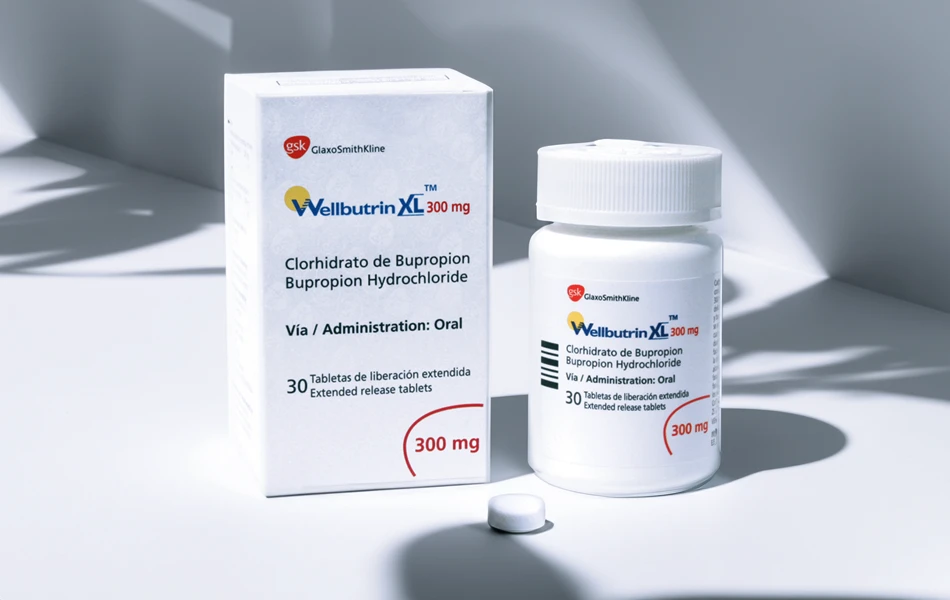Wellbutrin for ADHD: Effectiveness, Dosages, and Side Effects
Explore the effectiveness of Wellbutrin for ADHD, its side effects, and the different forms you can take.

Managing ADHD symptoms with stimulant medications may be challenging. Not everyone can tolerate the side effects, such as increased blood pressure, headaches, poor sleep, and an irregular appetite.
Instead, some doctors prescribe non-stimulant drugs to support those with ADHD. One popular treatment includes Wellbutrin, an antidepressant. Taking this medication could eliminate the risk of cardiovascular and gastrointestinal complications.
Are you interested in taking this non-stimulant for your health? Before doing so, discover the benefits and potential side effects of Wellbutrin, including why you should use the medication for treating ADHD.
Wellbutrin for ADHD: Is It an Effective Treatment?
Yes, using Wellbutrin for attention-deficit hyperactivity disorder (ADHD) treatment is effective. This medication can help relieve common symptoms such as impulsivity and hyperactivity.
Research suggests that Wellbutrin may decrease the severity of ADHD symptoms. Some benefits include more focus, better moods, and less restlessness. People could also experience fewer bouts of anxiety and depression associated with ADHD.
Up to 20% of patients who are treated for ADHD don’t react well to stimulants due to side effects such as nausea, jitteriness, anxiety, and insomnia. Therefore, non-stimulants like Wellbutrin can encourage the same positive outcome without potential health risks.
Consult with your doctor about trying this medication. They can prescribe Wellbutrin if you suffer from ADHD paralysis or are struggling to manage your symptoms.
What Is Wellbutrin?
Wellbutrin, also known as bupropion, is an antidepressant medication that primarily helps those with depression or mood disorders. It works by regulating neurotransmitters in the brain to improve your mood.
This antidepressant mainly targets norepinephrine and dopamine. These brain chemicals are responsible for reducing stress and enhancing mental pleasure. Over time, you should feel motivated, satisfied, focused, and less inclined to have suicidal thoughts.
The dosage depends on your medical condition. Doctors can increase your dose if you’re still feeling the negative side effects of depression. It’s important to keep a medical professional updated about how you’re feeling from the treatment.
Off-label use of Wellbutrin
Doctors may prescribe off-label Wellbutrin for antidepressant-induced sexual dysfunction, ADHD, anxiety, and depression related to bipolar disorder, nerve pain, seasonal affective disorder, post-traumatic stress disorder, and obesity.
Wellbutrin doesn’t just treat ADHD symptoms. Bupropion hydrochloride is an FDA-approved medication that boosts the happy chemicals in your brain, which relieves symptoms of many mental health disorders.
You can only get prescribed Wellbutrin from a doctor. They have to check your symptoms before giving off-label drugs proven to treat ADHD.
What Does Wellbutrin Do to the Brain?
Wellbutrin is a norepinephrine-dopamine reuptake inhibitor that can change your mood by increasing dopamine and norepinephrine. Your nerve cells release these chemicals to give you a sense of pleasure and satisfaction.
Studies show that people with depression or ADHD have unregulated neurons that don’t respond well to dopamine. This is a huge reason for inattention, low moods, and sudden bouts of aggression. Non-stimulant and stimulant medications can help regulate neurotransmitters in your brain.
Neurotransmitters are chemical messengers that affect your moods. Norepinephrine supports blood circulation to increase focus, while dopamine boosts pleasure, motivation, memory, and learning. Over a few weeks of taking Wellbutrin, you may experience fewer anxious thoughts and feelings.
Why Use Wellbutrin for ADHD?
Stimulant medications, such as amphetamines and methylphenidate, are usually the most effective treatment for ADHD. However, your doctor may prescribe a non-stimulant medication like Wellbutrin for other reasons.
One common reason includes the effectiveness of Wellbutrin. Some people experience more side effects when taking stimulants, meaning they need off-label prescriptions containing bupropion hydrochloride to prevent high blood pressure, sickness, and sleep problems.
Those with a history of medical conditions can also benefit from taking non-stimulant medication for ADHD. This is because stimulants, such as Adderall, often make symptoms worse in heart problems, eating disorders, and sleep disorders.
You should talk to your doctor about treating ADHD. Taking Wellbutrin might help other people, but it may not work the same for your health.
Dosage for ADHD
Wellbutrin has a variety of doses depending on your health. Some people may need stronger forms if they experience severe ADHD symptoms. Always check with your doctor before requesting a higher dosage.
Below are the recommended dosages for taking Wellbutrin:
Adult dosage
For adults between 18–64 years old, the typical dosage is 450mg a day in three single 150mg tablets. The starting dose can sometimes be lower at around 100mg, taken three times daily. A doctor cannot prescribe anything higher than 450mg.
Research suggests that a dose between 150mg and 450mg a day is effective. If you’re new to non-stimulant medication, your doctor may give you a low dose before gradually increasing it over a few months.
Child dosage
Doctors believe that children under 18 years old should not take Wellbutrin because of any potential risks. However, they can still prescribe this medication if they believe it’s the only effective option.
There is no official dosage for children. Medical professionals are more likely to give adolescents the lowest dose possible to ensure they’re healthy.
Forms of Wellbutrin
There are a few forms of Wellbutrin that the doctor may give you. Each non-stimulant has a unique dosage and time-release formulation. It’s important to learn about these formulas before taking any medication.
Wellbutrin has three tablet formulations:
- Wellbutrin (bupropion): This is a normal medication with an immediate release. You can take it two to three times daily, depending on your recommended dosage. It’s also easier for the doctor to increase this amount slowly over time to prevent side effects.
- Wellbutrin SR (bupropion SR): Most people take this tablet twice daily because of the 12-hour extended release. The medication stays in your blood for 12 hours since it is the sustained-release version.
- Wellbutrin XL (bupropion XL): You take XL once a day because it lasts for 24 hours in your blood. Taking more could result in side effects such as nausea, headaches, and stomach pain. An extended-release version suits those who often forget to take medication.
What Are the Possible Side Effects of Wellbutrin?
Any medication, whether they’re stimulants or not, can have side effects. It depends on how your body reacts to the sudden chemical changes. Remember that it’s normal to feel different when you start taking medication to treat symptoms of ADHD.
Some of the most common side effects include:
- Loss of appetite
- Agitation
- Insomnia
- Headaches
- Dry mouth
- Slow bowel movement
- Sweating
- Nausea
- Joint or muscle aches
- Irritability
However, you might get more severe side effects if you’re sensitive to ADHD medication. You should speak to a medical professional urgently if you experience:
- Blurred vision
- Vomiting
- Tremors
- Painful constipation
- Fast heartbeat
- Unusual weight loss
FAQs
No, Wellbutrin is not a stimulant because it doesn’t contain the active stimulants amphetamine and dextroamphetamine. Those who are sensitive to stimulant medications can take Wellbutrin for ADHD.
You may notice positive effects of Wellbutrin within one to two weeks. The time it takes for medication to work depends on your brain’s reaction. It could take longer for Wellbutrin to improve your moods.
Doctors recommended that people don’t take Wellbutrin and Adderall together because it increases the risk of seizures. Overwhelming your body with medication may also cause long-term heart problems such as high blood pressure and stroke.
A Word From an MD
People with attention-deficit hyperactivity disorder may struggle to manage their symptoms without medication. Sudden hyperactivity, impulsiveness, and aggression can create adverse effects on their mental health.
If you’re experiencing the same struggle, it may be time to try non-stimulants for ADHD. Not only can this prescription treat depression, but it can also improve your concentration and focus. You don’t have to spend hours zoning out or masking your behaviors outside. Of course, medication works differently for everyone, but it’s an effective option.
There are natural remedies for those who don’t want medication. For example, using mental health apps or going to yoga classes could reduce anxiety and hyperactivity symptoms. Younger children can attend behavioral therapy to better manage their emotions as they age.
Consult with your doctor for more guidance. Medical professionals can determine whether medication is necessary.
Conclusion
Taking Wellbutrin for ADHD is a safe way of managing your symptoms. Many clinical trials and research studies prove that a bupropion hydrochloride tablet, taken two to three times a day, will improve your overall mood. Just remember to talk to your doctor if you have any concerns or questions regarding this medication.

















































 Select your language:
Select your language: 









